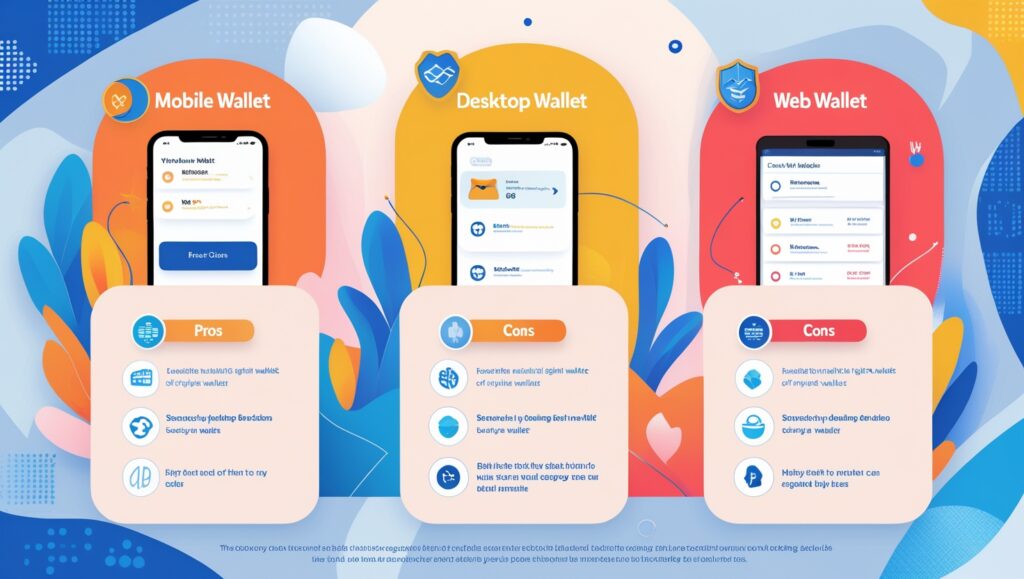Cryptocurrencies like Bitcoin, Ethereum, and Solana are changing how we think about money. But if you’ve ever tried getting into crypto, you’ve probably come across the term “crypto wallet.”
So, what exactly is a crypto wallet? Is it like a physical wallet? How do you store digital coins? And how do you choose the right one?
Let’s break it all down in simple terms. This beginner-friendly guide will explain what a crypto wallet is, the different types, their pros and cons, and how to choose the best one based on your needs.
🧠 What Is a Crypto Wallet?
A crypto wallet is a tool that lets you store, receive, and send cryptocurrencies. But instead of holding coins like a physical wallet, it stores something called private keys—which are like passwords that allow you to access and control your digital assets on the blockchain.
You don’t actually store the coins in the wallet. Instead, your wallet interacts with the blockchain to manage your balance and authorize transactions.

🔐 Public Keys vs Private Keys
To understand crypto wallets, you need to understand two important keys:
- Public Key: Like your bank account number. You can share it to receive funds.
- Private Key: Like your ATM PIN. You must keep it secret. Whoever has this can access your funds.
Your wallet manages both. If you lose access to your private key, you could permanently lose your crypto.
🧳 Types of Crypto Wallets
There are two main categories of wallets: hot wallets and cold wallets. Let’s explore what they are and which is best for you.
🔥 1. Hot Wallets (Connected to the Internet)
Hot wallets are software-based and always connected to the internet. They’re more convenient but less secure than cold wallets.
a. Mobile Wallets
- Apps like Trust Wallet, MetaMask, or Coinbase Wallet,
- Easy to use for daily transactions
- Best for beginners
b. Desktop Wallets
- Software installed on your computer
- Offers more control and security
- Examples: Exodus, Electrum
c. Web Wallets
- Accessed through a browser (e.g., wallet on an exchange like Binance)
- Most convenient
- Least secure

🧊 2. Cold Wallets (Offline Storage)
Cold wallets are not connected to the internet, making them much more secure from hackers.
a. Hardware Wallets
- USB-like devices (e.g., Ledger, Trezor)
- Store private keys offline
- Ideal for long-term holders
b. Paper Wallets
- Physical printout of your public and private keys
- Free, but fragile and risky if lost or damaged
c. Air-Gapped Devices
- Ultra-secure devices never connected to any network
- Used by institutions or high-value holders

🏆 Which Type of Wallet Is Best for You?
Here’s a simple guide to help you choose:
| Use Case | Recommended Wallet |
|---|---|
| Beginner | Mobile Wallet (e.g., Trust Wallet) |
| Frequent Trader | Web Wallet or Exchange Wallet |
| Long-Term Holder (HODLer) | Hardware Wallet |
| Maximum Security | Cold Wallet (Hardware or Air-Gapped) |
| No Internet Needed | Paper Wallet (with caution) |
📋 Pros and Cons of Each Wallet Type
✅ Hot Wallets
Pros:
- Fast and easy access
- Free or low cost
- Perfect for daily use
Cons:
- Online = vulnerable to hacks
- Depends on device security
✅ Cold Wallets
Pros:
- Extremely secure
- No online exposure
- Best for large holdings
Cons:
- Less convenient
- Can be expensive (hardware)
- Paper wallets can be easily lost
🛡️ Key Security Tips for Using Crypto Wallets
- Backup your seed phrase (the 12-24 word recovery phrase).
- Never share your private key.
- Use two-factor authentication when available.
- Store backups in a secure physical location (not on your phone or email).
- Be cautious of phishing attacks and fake apps.

🧠 Bonus: Multi-Sig Wallets (Advanced Users)
Multi-sig (multi-signature) wallets require more than one private key to authorize a transaction. Useful for:
- Businesses
- Joint accounts
- High-value wallets
They add an extra layer of protection against single-point failure.
Examples: Gnosis Safe, Casa Wallet
⚠️ Common Mistakes to Avoid
- Saving your seed phrase in Google Drive
- Sending coins to the wrong address
- Using untrusted wallet apps
- Skipping updates
One small mistake can cost you your entire balance.

🧭 Final Thoughts: Choosing the Right Wallet
There’s no one-size-fits-all wallet in the crypto world. The best wallet depends on how you plan to use your crypto.
If you’re trading often, a hot wallet works best. But if you’re holding for the long haul, cold storage is the way to go.
Always prioritize security. Remember: In crypto, you are your own bank. With great freedom comes great responsibility.
So choose wisely, secure your keys, and enjoy the world of decentralized finance safely.
